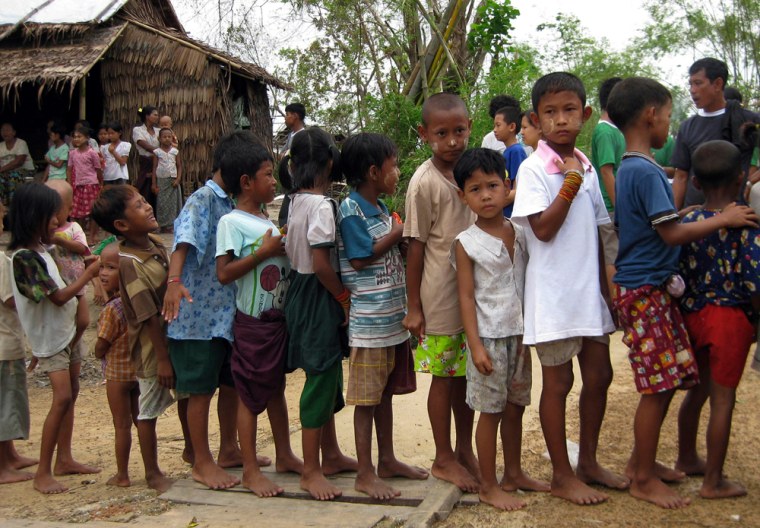Donor nations said they were ready to provide Myanmar with more than $100 million to help it recover from Cyclone Nargis, but warned the ruling junta Sunday they will not fully open their wallets until they are provided access to the hardest-hit areas.
U.N. Secretary-General Ban Ki-moon, speaking to The Associated Press after a one-day meeting of 51 donor nations, said he believed a turning point had been reached in getting Myanmar's isolationist junta to allow foreign aid workers unhindered entry into the devastated Irrawaddy delta.
"I'm cautiously optimistic that this could be a turning point for Myanmar to be more flexible, more practical, and face the reality as it is on the ground," Ban told The AP.
But Myanmar's leaders — and potential donors — continued to take a guarded tone.
Only civilian vessels allowed
Myanmar's Prime Minister Lt. Gen. Thein Sein said international aid "with no strings attached" was welcome. But he hedged on the sensitive issue of direct access, saying only civilian vessels could take part in the aid operation, and they would have to go through Yangon.
"Relief supplies can be transported by land, air or sea," he said. "But if relief supplies have to be transported by water, civilian vessels can come in through Yangon port."
That seemed to nix plans for U.S., British and French warships loaded with humanitarian supplies to join in the relief operation. The ships have been off Myanmar's coast for more than a week.
Myanmar's leaders have virtually barred foreign aid workers and international agencies from the delta because they fear a large influx of foreigners could lead to political interference in their internal affairs.
The junta is also hesitant to have its people see aid arriving directly from countries like the United States, which it has long treated as a hostile power seeking to invade or colonize the country.
Thein Sein, saying that 3,200 tons of humanitarian supplies have already been delivered from abroad, presented a long list of urgent needs, including temporary shelters, rice seeds, fertilizer and fishing boats.
Official estimates put the death toll about 78,000, with another 56,000 missing. Myanmar has estimated the economic damage at nearly $11 billion and the United Nations has launched an emergency appeal for $201 million.
At Sunday's meeting:
- The European Community, which has already pledged $72.5 million, offered another $26.8 million.
- China boosted its pledge to $11 million.
- Australia pledged $24 million.
- The Philippines doubled its previous pledge to $20 million.
- South Korea upped an earlier pledge for a total of $2.5 million.
Ban said the relief operation would last at least six months.
But skepticism hung over Sunday's conference.
"It is for a lack of information that not more has been given at this particular time," said George Yeo, who is Singapore's foreign minister and chairman of the Association of Southeast Asian Nations, which co-hosted the meeting with the United Nations, adding, "the problem is one of establishing greater trust between Myanmar and the world community."
Washington's representative, U.S. Deputy Assistant Secretary of State Scot Marciel, said the United States was prepared to offer much more than the $20.5 million already donated, but not until international disaster experts were allowed to thoroughly assess affected areas.
Australia and European diplomats, including those from Denmark, the Netherlands, Sweden and Germany, also offered conditional pledges.
"The reason we came is to support Ban Ki-moon," said Bert Koenders, the Dutch minister for development cooperation. "We're all very positive about what he has agreed with the government leader here, but also skeptical because you have to see the facts on the ground."
Myanmar's generals have a long history of making promises to top U.N. envoys, then breaking them when the international spotlight on their country fades.
The world body has repeatedly failed to convince the military to make democratic reforms and to release opposition leader and Nobel laureate Aung San Suu Kyi, whose five-year period of house arrest expires this week. Suu Kyi's house is just across a lake and visible from the hotel where the conference was held
Nyan Win, spokesman for Suu Kyi's National League of Democracy, said Sunday there has been "no sign at all" that she would be released. He said a decision on whether to free her or continue her detention would probably come Monday.
Ban did not push the matter, but said he regretted not being able to argue her case.
"I feel also very much concerned and troubled by not being able to address completely this issue," Ban said.
An estimate released Saturday by the U.N. said of the total 2.4 million people affected by the storm, about 42 percent had received some kind of emergency assistance. But of the 2 million people living in the 15 worst-affected townships, only 23 percent had been reached.
"Only a few weeks remain until the rice planting season begins," Ban said. "A failure to deal with this problem today will immeasurably compound our problems tomorrow."
